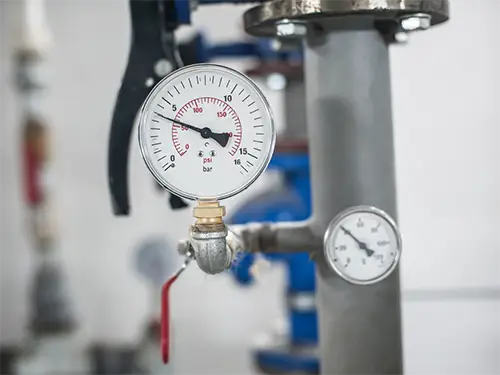 Have you ever turned on your faucet and marveled at the steady stream of running water, regardless of how many appliances or fixtures are running? That’s your water pressure regulator at work.
Have you ever turned on your faucet and marveled at the steady stream of running water, regardless of how many appliances or fixtures are running? That’s your water pressure regulator at work.
Also known as a pressure-reducing valve (PRV), this important part of your plumbing system helps water flow evenly and safely in your home. Without it, high or fluctuating water pressure could wreak havoc, damaging your pipes, appliances, and more.
But like any part of a plumbing system, water pressure regulators don’t last forever. In this article, we’ll cover how long they typically last, signs they’re failing, and what you can do to keep your plumbing system in good shape.
Key Takeaways
- Water pressure regulators, or PRVs, typically last 10–15 years.
- Regular maintenance can extend their lifespan and prevent costly repairs.
- Signs of a failing PRV include leaks, low water pressure, and noisy pipes.
- Ideal water pressure for homes is 55 PSI, with 80 PSI as the maximum safe limit.
Neglecting a failing PRV can lead to water damage, appliance failure, and increased utility costs.
Understanding Water Pressure Regulators
A water pressure regulator, or pressure-reducing valve (PRV), is a device that reduces the pressure from your main water supply line to a safe and manageable level for your home.
Key Functions:
- Protects your plumbing fixtures and appliances from damage caused by high water pressure.
- Ensures consistent, even water pressure throughout your home.
- Reduces strain on your plumbing system, helping to prevent leaks and bursts.
While a PRV is essential for homes with high or irregular municipal water pressure, not all homes need one. If your water pressure remains steady and safe without a PRV, you may not require one. However, in areas with frequent fluctuations or excessive pressure, a PRV is critical for preventing damage.
How Long Do Water Pressure Regulators Last?
The average lifespan of a water pressure regulator is 10–15 years, though this can vary based on factors like water quality, usage, and maintenance.
Factors That Affect Longevity:
- Water Quality: Hard water with high mineral content can cause buildup and wear over time.
- Usage Levels: Homes with frequent water usage may see their PRVs wear out faster.
- Maintenance: Regular inspections and timely repairs can significantly extend the life of your PRV.
To maximize your PRV’s lifespan, schedule annual inspections, check for signs of wear, and act quickly if problems arise.
Signs of a Failing Water Pressure Regulator
 If your PRV is nearing the end of its lifespan, you’ll likely notice some warning signs. Ignoring these can lead to serious plumbing problems.
If your PRV is nearing the end of its lifespan, you’ll likely notice some warning signs. Ignoring these can lead to serious plumbing problems.
Plumbing System Leaks
High water pressure strains pipes, joints, and weak points, often leading to leaks. While small leaks may go unnoticed, they can escalate into costly water damage. Look for water pooling near the PRV or other parts of your plumbing system.
Leaky Faucets
Excessive pressure can wear out gaskets and other components in your faucets, causing persistent drips. This wastes water and indicates your PRV isn’t doing its job.
Damaged Water Heater and Appliances
High pressure can accelerate wear and tear on appliances like washing machines, water heaters, and filtration systems. If these appliances need frequent repairs or replacements, your PRV may be failing.
Low Water Pressure
A failing PRV can cause inconsistent or reduced water pressure throughout your home. If your pressure drops suddenly, it could be a sign of a problem with the PRV rather than a broader plumbing issue.
Loud Pipes
Noisy pipes, often caused by the water hammer effect, are a common symptom of PRV issues. This can create structural concerns and annoying sounds throughout your home.
Recommended Water Pressure Levels
Maintaining the right water pressure is essential for a healthy plumbing system.
- Ideal Pressure: 55 PSI is the standard for most homes.
- Maximum Pressure: 80 PSI is the highest safe level allowed by many codes, including the Florida Plumbing Code.
High pressure can void warranties on plumbing fixtures and appliances and increase the risk of costly damage. A well-functioning PRV ensures your pressure stays within the safe range.
Water Pressure Regulator Maintenance
Routine maintenance is key to prolonging your PRV’s lifespan and preventing plumbing issues.
- Inspect Annually: Check for leaks, pressure inconsistencies, or signs of wear.
- Test Pressure Levels: Use a pressure gauge to ensure your water pressure stays within the recommended range.
- Adjust as Needed: If pressure issues arise, follow a guide to adjust the PRV.
- Replace When Necessary: When adjustments fail or wear becomes evident, replace the PRV promptly.
Neglecting maintenance can lead to issues like dripping faucets, running toilets, and even burst pipes. Address problems early to avoid extensive damage.
Suspect Your Water Pressure Regulator Is Failing?
 Don’t wait to address water pressure regulator problems. Ignoring signs like leaks, noisy pipes, or erratic water pressure can lead to extensive plumbing damage and higher repair costs.
Don’t wait to address water pressure regulator problems. Ignoring signs like leaks, noisy pipes, or erratic water pressure can lead to extensive plumbing damage and higher repair costs.
If you suspect your PRV needs attention, contact Benjamin Franklin Plumbing. Our punctual plumbers serve Niceville, FL, and the surrounding areas, ensuring quick, reliable repairs and replacements to keep your plumbing system running smoothly.
FAQs
What is a water pressure regulator?
A water pressure regulator, or PRV, is a device that reduces high water pressure from the main supply line to a safe level for your home.
How do I know if my water pressure regulator is failing?
Common signs include leaks, noisy pipes, low water pressure, and frequent appliance repairs.
Can I adjust my water pressure regulator myself?
Yes, you can adjust it using a wrench and a pressure gauge. However, if adjustments don’t resolve the issue, it may need replacement.
How often should I inspect my PRV?
Annual inspections are recommended to catch issues early and maintain optimal performance.
Final Thoughts
Your water pressure regulator plays an important role in protecting your plumbing system and ensuring consistent water flow. With regular maintenance and timely replacements, you can avoid costly repairs and enjoy a safe, efficient plumbing system.
For inspections, repairs, or replacements, contact Benjamin Franklin Plumbing in Niceville, FL. Our punctual plumbers are here to help with all your plumbing needs, ensuring your home stays comfortable and efficient year-round.